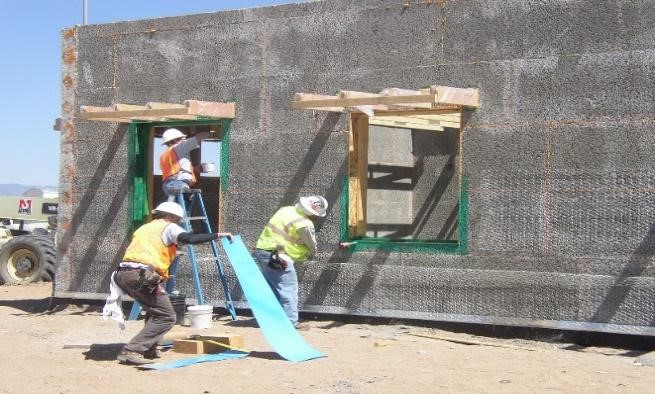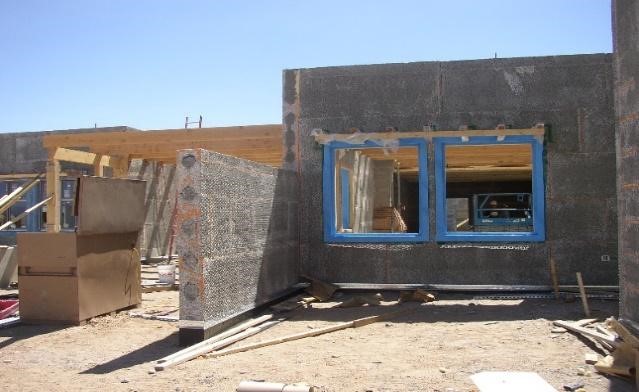WATER PROOFING
Above Grade
Legacy Block products do not wick water, rather it drains and can be left without finish for extended time. It is not water tight, however we do recommend waterproofing before a finishing system is applied.
CICF Waterproofing Elastomeric Liquid by LEGACY BLOCK
Legacy Block’s CICF Waterproofing Elastomeric Liquid requires no catalyst or solvents as part of this waterborne system. No special safety equipment or respirators are required (unless sprayed). The lack of an enzyme eliminates pot- life problems. The single component formulation could be used by brush, roller, or airless sprayer to many construction substrates.
The formula has color intentionally embedded so that no portion of what is being being waterproofed is missed.
It is also ideally suited for use with ceramic tile, stone, and EFIS applications. It forms a continuous waterproofing barrier with outstanding adhesion and reduces crack transmission in floors. Legacy’s CICF Waterproofing provides excellent flexibility and elongation with water-proofing properties that allow the span of cracks and voids in the substrate. Upon cure, the membrane will not soften with high temperatures or become brittle with low temperature.
Using Legacy Block’s CICF Waterproofing in advance of Legacy Block’s Alternative Stucco and Legacy Block’s final sealer is the complete finishing system.
Allow the first layer to harden for 24 to 36 hours. Do not let this layer dry out, if necessary, keep it damp by misting it with water, do not spray it with a pressure hose as it will dislodge the mortar.
After the stucco installation is complete, keep the stucco damp over several days; lightly mist the surface occasionally if necessary.
Complete the job by sealing around doors and window frames – these areas are especially susceptible to water penetration. This step is extremely important, intrusion of water into the Legacy Block wall has to be avoided. Particularly check all horizontal areas, like parapets and window sills. The proper way the seal is the following:


Two photos of proper window sealing Prime first (green is primer) then apply (blue) self-adhesive membrane. Order of membrane application is critical:
- Window Sill first
- Window jambs second
- Headers third
Should you choose traditional Stucco:
Henry Blue Skin SA Membrane and Henry Aqua Tac 545 Primer, Loxon primer by Sherwin Williams, or Seal Krete sealer. Be careful to follow all product instructions for any sealant you choose. Carefully follow application instructions of any sealant product you choose. Caulking gaps around windows, doors, or headers etc. shall be of adequate size in order to have sufficient caulking material to bridge any difference in expansion of the stucco and other materials.
In critical cases consider using a damp-proof layer between slab and the Legacy Block wall to block moisture rising from the foundation. Also, you may consider providing some possibility of moisture drainage such as a French drain. As well as installing the Legacy Block wall protruding for approximately ½” over the slab. Water getting caught in a Legacy Block wall (or as in any wall; wood or masonry) which is sealed with stucco with nowhere to go, may lead to wet spots, discoloration and damage.
Below Grade
Legacy Block walls installed below grade must be treated with a layer of protective sup grade waterproofing in accordance with Section 1806 of IBC. Any type of code approved system can be used (solvent containing products are no problem as only few EPS particles on the surface of the Legacy Block wall will be affected). Roll on, spray on, and then applying the membrane, protect the sealant as back-filling begins. In addition to the membrane one can also install a thin (1/2”) EPS sheet covering the sub grade.
